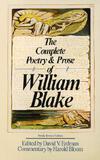
A long time ago (in high school), I was told by a teacher that he liked my poetry. It reminded him of William Blake. It’s the sort of comment that sticks with you. For me, I still remember it from time to time a decade and change later. It’s been a while since I’ve read any Blake, so perhaps it’s time for another go.
Throughout the Complete Works, there are essentially three parts to Blake’s writing:
- Philosophical writings on the nature of religion and the universe
- Straight random poetry in Songs of Innocence and Experience
- A looong collection of rambling poems detailing a strange fantastic mythology of angels, demons, and all sorts of other beings that seems to go on and on
The first is fascinating. Blake has quite a way with words:
Principle 1 : That the Poetic Genius is the True Man, and that the Body or Outward Form of Man is derived from the Poetic Genius. Likewise that the FOrms of all things are derived from their Genius, which by the Ancients was call’d an Angel and Spirit and Demon.
Principle 2 : As all men are alike in Outward Form; so, and with the same infinite variety, all are alike in the poetic Genius.
…
Principle 4 : As none travelling over known lands can find out the unknown; so, from already acquired knowledge, Man could not acquire more, therefor an universal Poetic Genius exists.
Principle 5 : The Religions of all Nations are derived from each Nation’s different reception of the Poetic Genius, which is everywhere call’d the Spirit of Prophecy.
I like it. It’s weird, but I see echos of my own personal beliefs in there.
The second is what most people think of when they think of Blake. I really do recommend that everyone give Songs of Innocence and Experience a read when they get a chance. And find an illustrated version. The works and illustrations were both done by Blake and make more of a feel.
My favorites:
- A Cradle Song
- Night
- Spring
- A Dream
- On Anothers Sorrow
- Earth’s Answer
- The Tyger
- My Pretty Rose Tree
- Infant Sorrow
- A Poison Tree
Infant Sorrow
My mother groand! my father wept.
Into the dangerous world I leapt:
Helpless, naked, piping loud;
Like a fiend hid in a cloud.Struggling in my fathers hands:
Striving against my swadling bands:
Bound and weary I thought best
To sulk upon my mothers breast.
Sounds so familiar.
In a lot of these, I see what that high school teacher meant. They are familiar to what I’d written and before I’d ever read Blake. It makes me want to write once more. There’s just something about reading and poetry. It lets you see the beauty in words and the world.
The third part, the weird mythology… has a lot of beautiful and terrible imagery.
3: Effluvia vapor’d above
In noxious clouds; these hover’d thick
Over the disorganiz’d Immortal,
Till petrific pain scurfd o’er the Lakes
As the bones of man, solid & dark
Blake has quite a way with words.
That being said, they just go on and on. Read a few pages. If you like it, there’s lots more. If you find yourself skipping ahead, just give it up. It doesn’t really change. Honestly, I skipped large parts. So it goes.
Overall, worth the read. It’s an interesting contrast to what I normally read. If you give it a try, make sure you look at the illustrated versions. So very wonderfully weird.